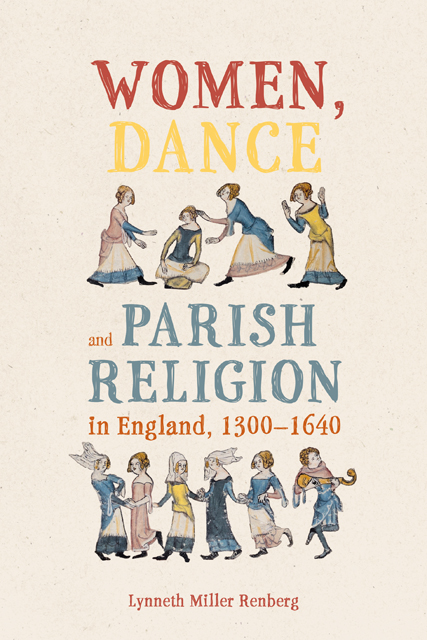Book contents
- Frontmatter
- Dedication
- Contents
- Acknowledgments
- List of Abbreviations
- Introduction
- 1 Reforming and Redefining True Religion
- 2 Dance and Protecting Sacred Space
- 3 Dance and Disrupting Sacred Time
- 4 “Satan Danced in the Person of the Damsel”
- 5 “In Her Dance She Had No Regard Unto God”
- 6 Performing Dance, Sin, and Gender
- Conclusions
- Appendix
- Timeline
- Bibliography
- Index
- Gender in the Middle Ages
3 - Dance and Disrupting Sacred Time
Published online by Cambridge University Press: 17 December 2022
- Frontmatter
- Dedication
- Contents
- Acknowledgments
- List of Abbreviations
- Introduction
- 1 Reforming and Redefining True Religion
- 2 Dance and Protecting Sacred Space
- 3 Dance and Disrupting Sacred Time
- 4 “Satan Danced in the Person of the Damsel”
- 5 “In Her Dance She Had No Regard Unto God”
- 6 Performing Dance, Sin, and Gender
- Conclusions
- Appendix
- Timeline
- Bibliography
- Index
- Gender in the Middle Ages
Summary
“What shall we say of the assemblies of our time, such as are gathered together in the Churches … where a man shall see nothing but riot and superfluity, and an unbridled liberty of drinking, dancing, playing, and reveling: they sanctify their assemblies not unto God, but unto Bacchus and Venus.” So reads one sixteenth-century sermon lamenting the abuse of the church and churchyard in early modern England. Sermons repeated this lament over and over throughout the sixteenth and seventeenth centuries. The physical space of the church itself was a hotly debated one within the context of the English Reformations, as battles over liturgy, vestments, and ritual raged in both country and city parishes. And debates over the keeping of the Sabbath showed that disputes over the use of sacred space were not confined to physical space but included time as well. Like in the thirteenth and fourteenth centuries, arguments over the proper use of these two spaces – physical and temporal – often overlapped. This was particularly apparent in arguments about dancing, as many of the events at which dancing occurred as a regular part of parish life happened in the parish churchyard on Sundays or religious holidays, since these remained the only days kept entirely free from labor in the sixteenth and seventeenth centuries. The controversies over King James I’s 1618 Book of Sports, which declared dancing on the Sabbath to be a “lawful recreation,” well display this struggle to define these boundaries of sacred space and time and the accompanying fight for authority over sacred space that played out through many of the sacramentalist and ritualist controversies of the English Reformations. In short, the battle for the churchyard did not end with the carolers of the medieval period but continued into a conflict with the Morris dancers and parish procession dancers of the sixteenth and seventeenth centuries.
Many scholars have looked at Sabbatarianism as a sixteenth-century development. Ronald Hutton, Christopher Marsh, David Katz, Kenneth Parker, and James T. Dennison, among others, have considered the growing debate over the Sabbath between the various factions of the English Reformations, a debate that often centered on reserving Sunday for worship and good works. Within this discussion, scholars generally treat dance as a peripheral issue tied to changing parish festivities and rituals rather than as something integrally bound to the larger theological concerns of Sabbatarianism.
- Type
- Chapter
- Information
- Women, Dance and Parish Religion in England, 1300-1640Negotiating the Steps of Faith, pp. 77 - 104Publisher: Boydell & BrewerPrint publication year: 2022



